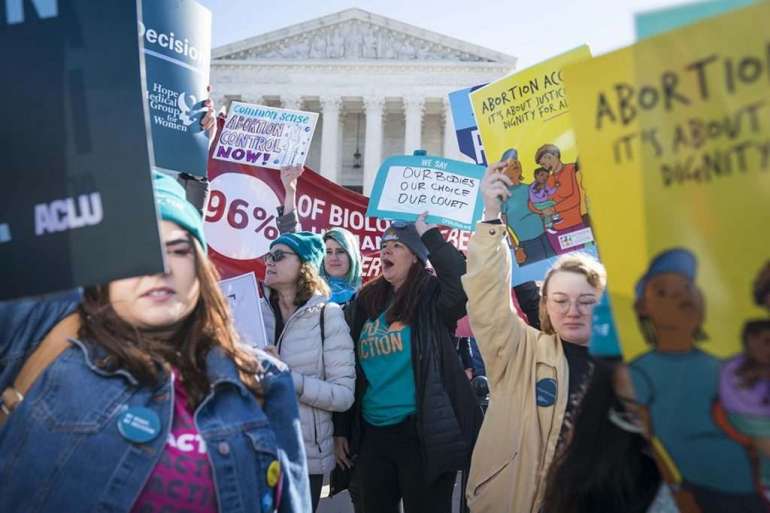Abortion rights groups break with progressive counterparts on filibuster

The dilemma is more apparent as red states rush to enact a new wave of abortion curbs in hopes of prompting the Supreme Court to revisit and potentially overturn Roe vs. Wade, the landmark decision legalizing abortion nationwide. At the same time, congressional Democrats find themselves stymied on abortion rights bills that, for example, would codify the Roe decision or block states from enacting abortion bans that are not deemed medically necessary, with a handful of conservative Democrats opposed to lifting restrictions on the procedure.
“If you’re Planned Parenthood or another progressive group, the possibility of getting federal pro-choice legislation passed is fairly remote,” said Mary Ziegler, a professor at the Florida State University College of Law who’s an expert on the abortion debate. “Keeping the filibuster for a rainy day when Republicans are controlling Congress makes sense for them.”
Indeed, some recent Republican anti-abortion bills have been blocked only because of the Senate’s 60-vote threshold for legislation, including a ban on the procedure after 20 weeks of pregnancy that garnered 53 votes in the previous Congress. Experts on abortion politics believe such bills would easily get through a Republican-controlled, post-filibuster chamber and be signed into law if the GOP controlled the House and the presidency.
“We’re very supportive of those groups who are coming out against the filibuster, and we’re not going to work against their push to end it, but it’s not our focus,” said a Planned Parenthood official, who declined to be identified because of the sensitivity of the matter. “There are always threats to abortion rights, filibuster or not. We are always at risk and under attack no matter who is in Congress or what the rules are.”
A spokesperson for NARAL said the filibuster is “a dynamic, moving target, and we’re watching the conversation really closely.”
President Joe Biden on Thursday declined to say whether he would support ending the 60-vote threshold for passing most bills, even though the tactic continues to imperil his party’s agenda. “It’s going to be hard to get a parliamentary ruling that allows 50 votes to end the filibuster, the existence of a filibuster,” he said during his first news conference as president.
Abortion foes who’ve long backed the filibuster — themselves worried about the potential for Democrats to roll back abortion restrictions — have ramped up their advocacy around the issue with radio ads, billboards and rallies urging West Virginia Sen. Joe Manchin, one of few anti-abortion Democrats, to hold the line and oppose any rules change. And conservatives are warning those abortion rights supporters tempted to wade into the fray to be careful what they wish for.
“Just ask Harry Reid how that went with the judicial filibuster,” said Kristan Hawkins, the president of Students for Life of America, referencing the Democratic leader’s 2013 “nuclear option” that lowered the 60-vote threshold for most presidential nominations. In 2017, Republicans pushed through another rules change that would allow President Donald Trump to get three justices confirmed through a simple majority vote.
Hawkins, whose group held a rally in Charleston, W.Va., and bought billboards reading “Save babies, save the filibuster,” said she’s long urged fellow conservative activists to look beyond the short-term gain of passing individual abortion bans and focus on the long-term threat of more structural reforms Democrats want to pursue.
The anti-abortion group Susan B. Anthony List similarly targeted Manchin with a recent six-figure radio and digital ad campaign that argued for keeping the filibuster, warning in the spots that Democrats would otherwise authorize “taxpayer funded abortion” and “pack the Supreme Court with pro-abortion liberals.”
“There are definitely differing opinions in the pro-life movement and people who said we should have gotten rid of [the filibuster] when we had the chance,” said Mallory Quigley, the group’s vice president of communications . “But even when the shoe was on the other foot, we didn’t do it, because we’re in this for lasting change.”
Even if Democrats abolish the filibuster and pass an array of pro-abortion rights laws, they’d likely find an unfavorable reception in a federal court system that’s been filled out by scores of Trump appointees — not to mention conservatives’ 6-3 Supreme Court majority.
Hirono said there’s still a benefit to bringing up bills and holding up-or-down votes, which puts senators on the record on hot-button issues like abortion. Beyond legislation to write Roe v. Wade into law, abortion rights groups want to press forward with bills that would, for example, permanently end the Mexico City Policy — a ban on international aid for health groups overseas that provide or refer for abortions.
“If we’re going to move some of the really important legislation that we need to, I think we’re going to need to do filibuster reform. Otherwise you’re going to see Mitch McConnell blocking everything,” she said.
But the more cautious stance may be winning out, even if it splits abortion rights groups from some long-term allies.
“We have really close relationships with immigrant justice and economic justice groups and we want to be in allyship with them on this,” said Kelsey Ryland, the co-director of abortion coverage campaigns at All* Above All. “But we have seen in previous Congresses that the filibuster is what has stood between us and nationwide bans on abortion care. We have a lot of history with really bad bills that would have decimated access if they’d been implemented.”